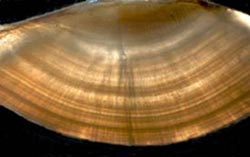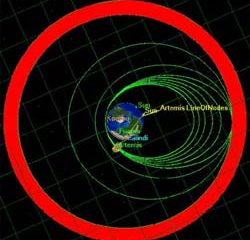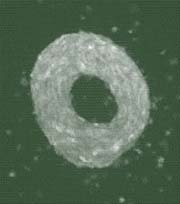
Using tiny bone fragments from fossilized fish, scientists have traced the roots of the climate phenomenon known as El Niño, the intermittent warming of ocean waters off the coast of Peru that can affect weather worldwide. According to a report published in the current issue of the journal Science, modern El Niño conditions arose around 5,000 years ago.
Previous research based on fossilized mollusk remains had suggested that El Niño conditions did not exist thousands of years ago, but those

Thanks to ion propulsion, the Artemis mission is turning near-defeat into a success story. Nominal operations could start this summer, with ESA’s satellite, manufactured by Alenia Spazio as prime contractor (I), playing a significant role in the pursuit of high technology and advanced telecommunications.
On 12 July 2001, 30 minutes after lift-off from Europe’s spaceport in Kourou, French Guiana, it became apparent that the Ariane 5 launcher had propelled the Artemis satellite into a transf

The phrase `rain stopped play` is gloomily familiar to fans of Wimbledon, international cricket test matches and other major sporting tournaments.
But cancelling matches because the pitch is waterlogged could be consigned to history, thanks to new technology which could revolutionise the international world of both professional and amateur sport.
Researchers at the University of Newcastle upon Tyne are starting trials involving a completely new concept – Electrokinetic Geosynthetic

Researchers studying plant behaviour have discovered similarities between the processes preventing plants from wilting and humans from suffering impotence. Data recently published by the University of the West of England shows the same chemical chain of events is involved in both situations – and has led to an understanding of how water loss from plants might be reduced.
This blocking action has parallels with the chemical effect of impotence treatments in humans. Plants lose water through

Miniature floating craft can be programmed to move and assemble in complex ways.
Harvard chemists are playing with bath toys. Floating bubble-powered craft designed to attract and repel one another, are helping them model the machinations of groups such as foraging ants, nest-building termites or schools of fish 1 .
Group dynamics are not always obvious from individuals’ behaviour, but emerge from their interactions. Computer models can simulate such processe

It is possible to measure levels of the stress hormone cortisol not only in blood but also in saliva. Linköping physician Elisabeth Aardal-Eriksson has further developed a saliva test to make it reliable and easy to use, not only in hospitals but also in the field. The findings are presented in a dissertation at Linköping University, Sweden. The researcher has also found that the corisol content of saliva is related to the occurrence of so-called posttraumatic symptoms of stress.
In the fir

– new calculation confirms standard model of particle physics. Contribution of hadronic vacuum polarization determined with unprecedented accuracy. The magnetic moment of the muon is an important precision parameter for…
Technique may prevent formation of unwanted waves that siphon off needed energy. Heating plasma to the ultra-high temperatures needed for fusion reactions requires more than turning the dial on a…

An international team of astronomers, led by researchers from the Astronomical Observatory of the University of Warsaw, have identified a new class of cosmic X-ray sources. The findings have been…

How deubiquitinases USP53 and USP54 cleave long polyubiquitin chains and how the former is linked to liver disease in children. Deubiquitinases (DUBs) are enzymes used by cells to trim protein…

Conceptual blueprint to analyze experimental catalyst data. Machine learning (ML) models have recently become popular in the field of heterogeneous catalyst design. The inherent complexity of the interactions between catalyst…

Antibody that Neutralizes Inhibitory Factors Involved in Nerve Regeneration Leads to Enhanced Motor Function after Acute Spinal Cord Injury. Researchers at 13 clinics in Germany, Switzerland, the Czech Republic and…

How simulations help manufacturing of modern displays. Modern materials must be recyclable and sustainable. Consumer electronics is no exception, with organic light-emitting diodes (OLEDs) taking over modern televisions and portable…

“Neurons that fire together, wire together” describes the neural plasticity seen in human brains, but neurons grown in a dish don’t seem to follow these rules. Neurons that are cultured…

The quest for sustainable energy solutions has been a major focus of scientific research for decades. Solar energy, a clean and renewable source, has emerged as a promising alternative to…

With a processing speed a billion times faster than nature, chip-based laser neuron could help advance AI tasks such as pattern recognition and sequence prediction. Researchers have developed a laser-based…

New technology could remotely identify various types of plastics, offering a valuable tool for future monitoring and analysis of oceanic plastic pollution. Researchers have developed a new hyperspectral Raman imaging…

Artificial Intelligence (AI) has established a strong presence across industries, large and small. The “VoBaKI” research project has empowered small and medium-sized enterprises (SMEs) with an innovative tool to independently…